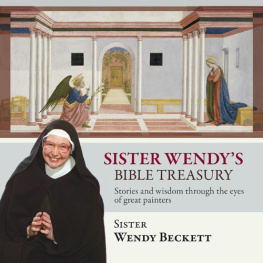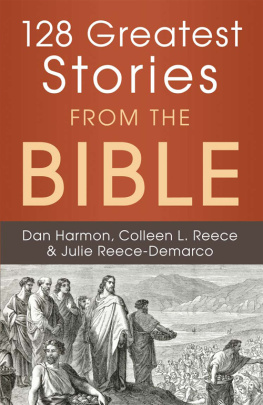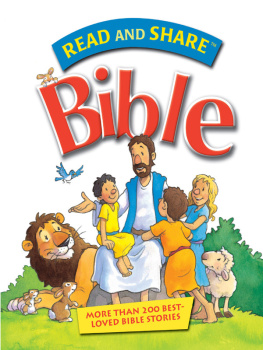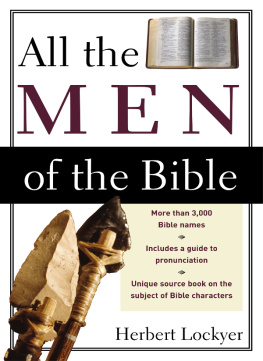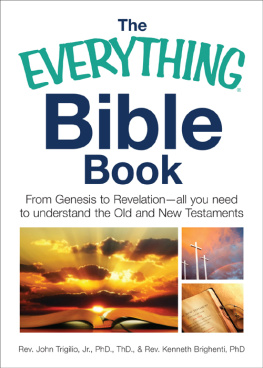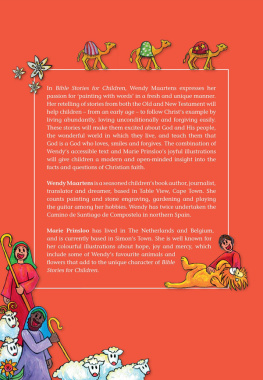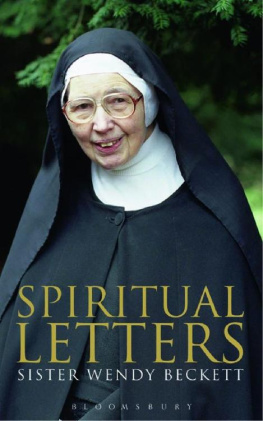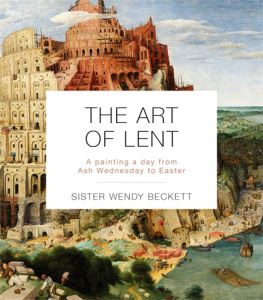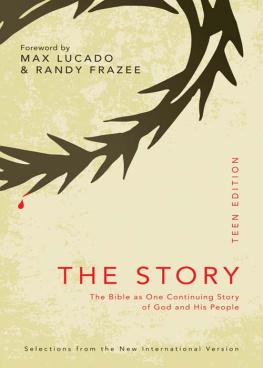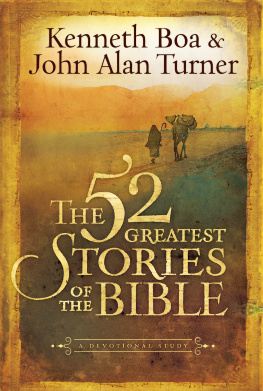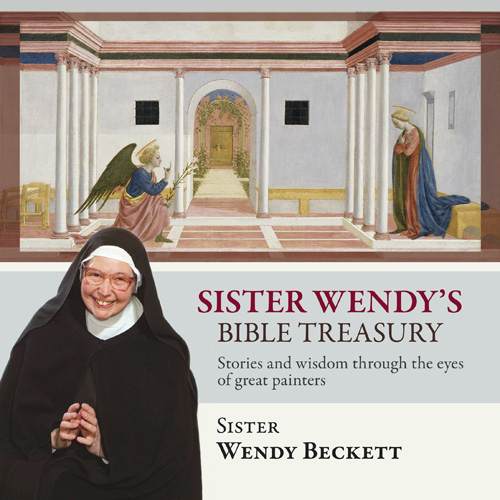

First published in Great Britain in 2012
Society for Promoting Christian Knowledge
36 Causton Street
London SW1P 4ST
www.spckpublishing.co.uk
Copyright Sister Wendy Beckett 2012
Selection, abridgement and arrangement of Bible text Philip Law 2012
All rights reserved. No part of this book may be reproduced or transmitted in any form or by any means, electronic or mechanical, including photocopying, recording, or by any
information storage and retrieval system, without permission in writing from the publisher.
SPCK does not necessarily endorse the individual views contained in its publications.
Extracts from the Authorized Version of the Bible (The King James Bible), 1611, the rights of which are vested in the Crown, are reproduced by permission of the Crowns Patentee, Cambridge University Press.
British Library Cataloguing-in-Publication Data
A catalogue record for this book is available from the British Library
ISBN 9780281066186
eBook ISBN: 9780281068500
Typeset by Caroline Waldron, Wirral, Cheshire
eBook by Graphicraft Ltd, Hong Kong
CONTENTS
When I was a child, I used to think the word bible meant book: THE Book, the Good Book, Gods Holy Book of Revelation. But now my knowledge of Greek, pitiably small though it is, informs me better. Bible means books; it is a plural word, a recognition of the fact that there are 40 books in the Old Testament (plus six that were written too late to make the Jewish Scriptures, the Apocryphal Books) and there are 27 in the New Testament. These books are immensely diverse. If the New Testament is relatively homogeneous (Gospels, Acts, Letters, Book of Revelation), the Old Testament ranges through all the varieties of literary genre, as well as encompassing hundreds of years. Everything in the New Testament was written, probably, in the first century; it is likely that the Old Testament ranges from almost 1000 BC to the coming of Christ. So not only do the books of the Old Testament arise from very different times and contexts, but they encompass an extraordinary diversity of style and manner. The first five books, the Pentateuch, were the most sacred to the Jewish people. Known as the Torah, it gave sublime expression to what is called the Law. Then the other 35 books are divided into the Prophets many prophets, the earlier and the later, the major and the minor the histories, and the catch-all phrase the writings, which include poetry and theology and moral teaching. I think everyone should read through the entire Bible at least once, and know the extraordinary experience of moving from arid regulations, necessary for the moral survival of the early Hebrews, to the soaring religious poetry of the great Prophets or the erotic intensity of a sublime poem such as the Song of Songs. Because it is such a long and diverse book, containing material from so many past centuries, the Old Testament does not give off its spiritual fragrance too easily. Hence this abbreviation, which singles out passages of great beauty and meaning to which all who seek for God cannot but respond. This book, though, is really meant as a taster to entice you to read more deeply into the entire Bible.
Because there are so many books in the Bible, it has been called a library, but I think this is a misnomer. The contents of both Testaments may be diverse, but they have a single theme. Every word in the Bible is a word of revelation. Every story, however amusing or as often happens in the Old Testament shocking or at least surprising, is not a story to be enjoyed for its own sake. It is there for a purpose. It will reveal something of the nature of God, his plans for us and the way they are fulfilled. The divisions of the Bible, Old and New Testaments, are based upon Gods covenant with his creatures. Covenant, which means solemn promise, is shorthand for the obligation God expresses to care for his people and bring them to their fulfilment. Over the centuries we are talking of the Old Testament the nature of this promise became more and more evident. It could not be put into the explicitness of words, because it was so utterly extraordinary. God would fulfil his promise by becoming man himself, by dying for us and drawing us with him into his resurrection. This is what the New Testament is all about, the extraordinary culmination of the Old Testament covenant. The Jewish people, listening over the centuries to the teachings of the Scriptures, finally offered God a woman so pure that within her womb he could become incarnate. And in that same turbulent first century, the Jewish people could offer God men who understood his revelation, such as the Twelve Apostles, the four Gospel writers (especially St John) and St Paul. Such profound insight into the divine mysteries could only come from a culture that had striven to be close to God for long and painful periods. In no other nation could Mary have been born. In no other nation could the letters of St Paul have been written, or the Gospels in their luminous simplicity.
We can hear Gods word in the strictly spiritual passages of the Bible, but one of its most important messages is that he also speaks through material and secular events. The history of the Israelites, with all their ups and downs, tragedies and triumphs, is God revealing how he guides and shapes the lives of all of us. Nothing is pointless. Everything can be used, and should be used. All that we need to teach us about happiness is within this one sacred book.
In prayer and in the sacraments, God comes very close to us, but he does not speak in words. The words we will hear and they must be interpreted within the prayer of the Church are here in the Bible. We cannot truly hear unless we pray. St John of the Cross tells us:
One Word spake the Father, that Word was His Son,
This Word He speaks ever in silence eternal.
May looking at these paintings draw us deeper into the silence of that Word.
To all who desire the sincere milk of the word, that they may grow thereby
(1 Peter 2.2)

St ories and Wisdom
from the
OLD TESTAMENT

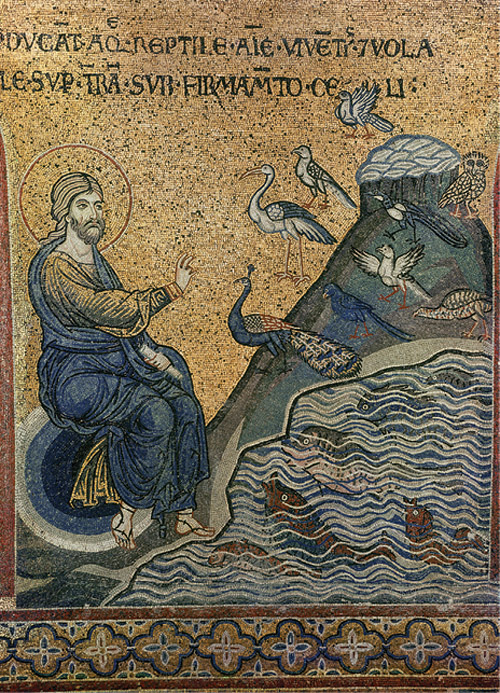

The stories in the Book of Genesis come from the profundities of the Jewish imagination, but they are not, strictly, Jewish stories. Before the Bible narrows down to Gods dealings with his chosen people, the Jews, it tells us of the beginnings from which every nation and the world itself have arisen. This is our beginning whether we are British or American or Chinese or Nigerian or Brazilian. Many nations have their own creation story, but this is the story as God revealed it. Clearly, it is a story not a history, still less a scientific treatise. Although we know all the details (this is certainly the best known portion of the Bible), it is not the elements of the stories that matter, but their significance. God created out of his own pure goodness; his only motive was to share what he was. So we hear of the wonders of that six day creation and the beauties of the Garden of Eden. Then bitter reality strikes home. We creatures are unwilling to accept what God is so eager to give, and so we have the Fall followed with sinister speed by one brother murdering another. Yet Gods involvement continues. The Flood, which other nations also wrote about though with a different emphasis, is intended to be a purifying flood. The writer of Genesis (or maybe writers, because there are many styles at work here) does not delude himself; he is ruefully aware that the purification is only partial, and we come to the anger and violence of the Tower of Babel.
Next page
